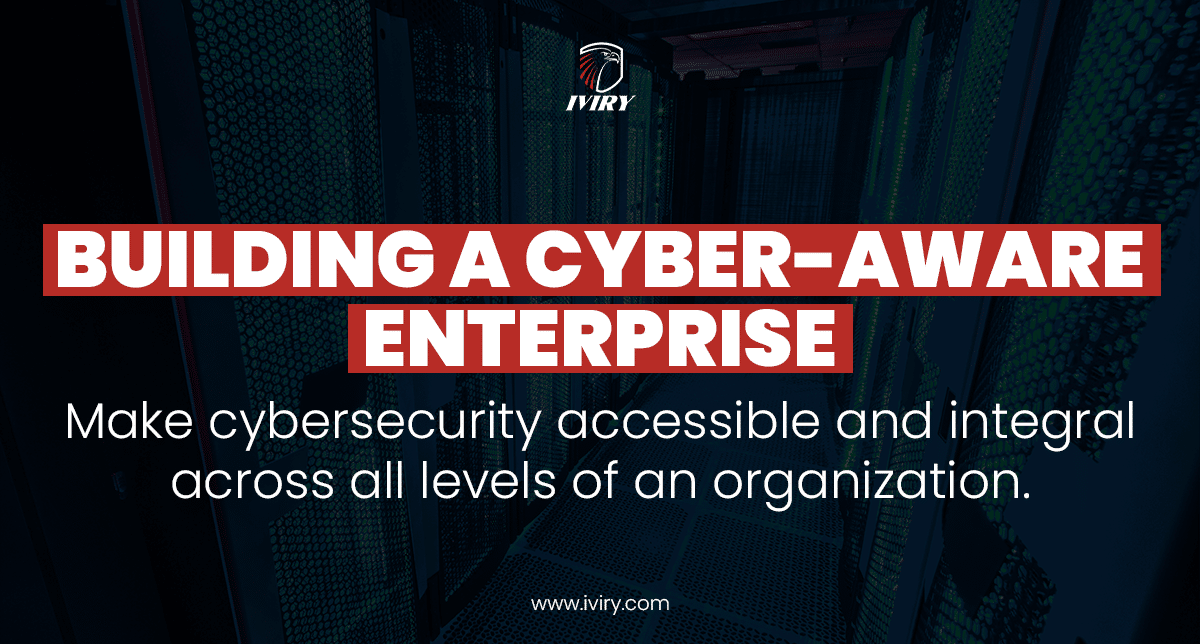Why Cybersecurity Awareness Must Extend Beyond IT — and How to Make It Stick
Cybersecurity has evolved far beyond the confines of the IT department. Today, the biggest vulnerabilities in an organization aren’t just technical — they’re human. From misdirected emails and weak passwords to social engineering attacks, employees at all levels are increasingly targeted as entry points for cybercriminals.
Creating a truly secure organization means more than implementing firewalls and endpoint protection. It requires cultivating a culture of cyber awareness that touches every department, every team, and every tool — from HR to finance to operations.
At Iviry, we believe the strongest cybersecurity strategies don’t start with hardware — they start with people. Here’s how organizations can begin building a cyber-aware enterprise that’s not only more secure, but more resilient.
Cyber Threats Are Evolving — and So Must Your Workforce
Today’s cyber threats are more sophisticated, persistent, and personalized than ever before. Phishing scams no longer look like amateur emails — they’re tailored, timely, and convincing. Ransomware doesn’t just lock systems — it targets critical infrastructure and supply chains.
What’s changed most significantly, though, is the attack surface. With the rise of hybrid work, cloud-based tools, and digital collaboration platforms, every device, user, and data flow is a potential risk. This means the traditional perimeter-based security model is no longer enough. Protection must now extend to the edge — and that includes people.
Unfortunately, many organizations are still operating under the assumption that cybersecurity is “someone else’s job.” That mindset leaves gaps — and those gaps are where real damage occurs.
Why Cyber Awareness Must Be Organizational, Not Optional
The truth is, a single employee clicking the wrong link or reusing a compromised password can compromise an entire network. And it’s not a hypothetical — it’s the most common way breaches happen.
A cyber-aware enterprise recognizes that every person — regardless of title or department — plays a role in defending the business. This cultural shift transforms cybersecurity from a technical obligation into a shared responsibility.
The benefits of building this kind of organization are clear:
- Fewer successful phishing attempts
- Stronger incident response from non-technical staff
- Greater trust from clients and regulators
- Improved compliance with frameworks like CMMC and NIST
But building that culture requires more than a once-a-year training video.
Practical Tools for Creating a Cyber-Aware Culture
At Iviry, we help businesses operationalize cybersecurity awareness in practical, lasting ways. Here are the tools and strategies that make it real:
1. Targeted Employee Training
Generic security training has limited impact. Instead, organizations should provide role-specific education that helps employees understand how cyber risks affect their specific responsibilities — whether they’re handling sensitive client data, managing invoices, or controlling access to cloud systems.
We design programs that resonate with different departments — from executive risk briefings to operational security simulations.
2. Phishing Simulations
One of the most effective tools for raising awareness is controlled phishing campaigns. These help teams recognize real-world attack tactics in a safe environment — and identify who may need further training. Iviry deploys tailored simulation exercises to reinforce vigilance and accountability across departments.
3. Security Policy Integration
Policies are often treated as formalities. We help clients integrate cybersecurity expectations into their onboarding, procurement, and vendor management processes, so they become part of everyday workflows rather than stand-alone documents.
Clear, accessible policies empower employees to make smart decisions without needing constant IT intervention.
4. Secure Collaboration Tools
Many breaches stem from misuse of everyday platforms — email, file sharing, messaging apps. We ensure teams are using secure, compliant communication tools, and more importantly, that they know how to use them safely.
Training your team to recognize and report suspicious activity through these platforms can turn potential incidents into early warnings.
5. Leadership Buy-In
Cyber awareness must be modeled from the top. When leadership treats security as a business imperative — not just a technical checkbox — it signals to the rest of the organization that it’s a shared priority.
At Iviry, we regularly brief executive teams to help align cybersecurity strategy with business goals, budgets, and growth plans.
Cyber-Awareness as a Strategic Asset
When an organization becomes cyber-aware, it doesn’t just prevent attacks — it gains operational resilience. Teams respond faster to threats. Compliance becomes easier. Customer trust grows stronger. In high-stakes sectors like defense, finance, and critical infrastructure, that awareness becomes a powerful differentiator.
What’s more, cyber-aware teams create less friction for IT and compliance leaders. Instead of reacting to mistakes, leaders can focus on long-term planning, proactive security measures, and continuous improvement.
How Iviry Helps You Build a Cyber-Aware Enterprise
At Iviry, we combine technical expertise with culture-building strategies. We help clients go beyond tools — building people-first security programs that foster accountability, confidence, and clarity at every level.
Whether your team needs structured awareness campaigns, security simulations, or a full organizational readiness assessment, we design and deliver programs that stick — and scale.
Cybersecurity shouldn’t be a barrier to business. It should be baked into how business is done.
Ready to Make Awareness a Competitive Advantage?
Your people are your first and last line of defense. Let’s empower them to lead with awareness — and protect what matters most.
Learn more at www.iviry.com or contact our team to start building your cyber-aware enterprise today.





